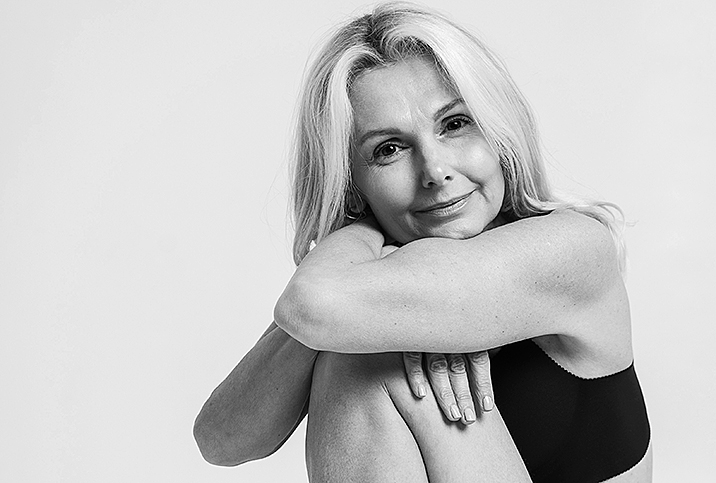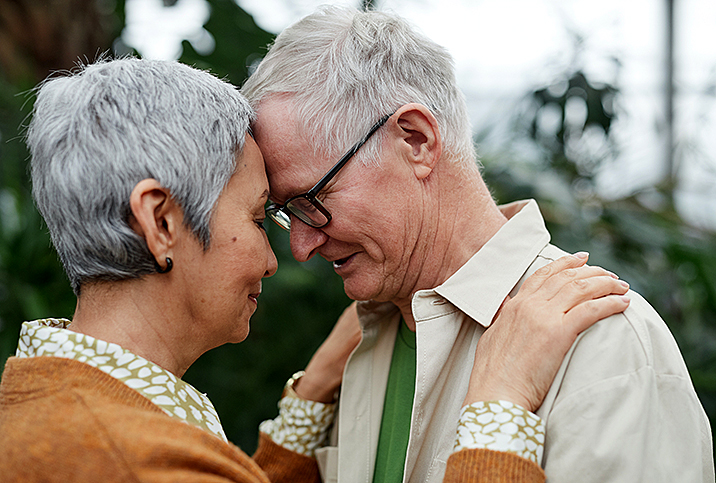A Positive Outlook on Aging Is Linked to Sexual Satisfaction

Dismantling misconceptions of aging might help older adults in the bedroom, a new study suggests. Older cisgender couples who hold positive attitudes toward aging have healthier sex lives, according to "Sexual Activity and Satisfaction in Older Adult Dyads: The Role of Perceptions of Aging," new research published in August 2022 by the Gerontologist.
The study's lead author, Hanamori Skoblow, a doctoral student at the University of Missouri, explained that her latest research delves into how internalized societal beliefs about aging impact our sexual health.
"There's really robust literature on how when we feel better about aging, we have better health outcomes," Skoblow said. "We have better balance, we have better cognitive functioning, even little things, like we have better handwriting, and also big things, like we live longer. And then the reverse is true, too. When we don't feel well about aging, then we also experience a greater likelihood of cardiovascular disease, worse cognitive functioning and shorter life spans."
In order to examine the associations between an individual's outlook on aging and sexual frequency and satisfaction, one of Skoblow's co-authors, based in Germany, analyzed self-reported survey response data from more than 1,120 married, cisgender, cohabiting couples, 50 years or older, living independently across England as documented in the English Longitudinal Study of Ageing (ELSA).
"This is the first paper that extends that literature to sexual health and it's been a really exciting project," Skoblow said. "I've been excited to see the findings."
Gaining access to the well-known European data required the help of her international co-author.
"Unfortunately, there are really very few publicly available data sets like this one that include both perceptions of aging and sexuality measures and assess older couples," Skoblow added. "This is the only data set to my knowledge that had all of those variables available. And it's actually really difficult to gain access to it as someone who is not in the European Union, so we had this fabulous collaborator, a really wonderful German scientist [Johanna Drewelies], and she was able to request the data and run the analysis there. It was quite an adventure."
Interpreting the data
Couples who reported positive general and personal perceptions of aging individually also reported better sex lives, Skoblow's research indicated.
"Our primary finding is when men and women feel more positively about aging, they also experience more positive sexual encounters," the author explained. "But I think what's really important here is that this is true over and above their perceived physical health or how satisfied they were in their relationship."
The study also accounted for how often either partner reportedly experienced sexual dysfunction.
"Partners' perceptions of aging were linked with sexual frequency and satisfaction even when they experienced vaginal dryness, erectile dysfunction or when couples experienced both," Skoblow said. "It's powerful because it shows psychological factors, not just biomedical ones, are related to a fulfilling sex life as we age."
Societal perceptions that individuals internalize mentally can negatively or positively impact their sexual health and satisfaction, according to the study.
"I think, ultimately, there's a misconception that biology is the only predictor of sexual health in later life," Skoblow said. "We often think about how changes in hormones, prescription medications or physical health impacts sexuality as we age, and those are real contributors. But they're not the whole story. We know from other work, and this work, that our attitudes and beliefs also impact our sexual health."
People do not age in a vacuum, Skoblow noted.
"We age embedded within a society, and so we internalize our society's belief about aging. And that includes the idea that older adults don't value or engage in sexual activity," she said. "But of course, that's not true at all. These societal stereotypes about aging and sex tell us that to age is to be less sexually desirable, that sexual expression is only appropriate for younger adults and that talking about sex in later life is taboo. But our research shows that when people reject those ideas and instead feel better about aging, they're also engaging in sexual acts more frequently and they are more satisfied with their overall sex lives."
She said myths painting older adulthood as a time of celibacy need to be deconstructed in order to promote healthy and satisfying sex lives throughout the decades.
Looking to the future
Skoblow hopes her team's analysis can aid doctors as they care for older adults.
"We know from past work that some physicians are reluctant to discuss sexual issues with their older patients, but all that does is reinforce the ageist belief that sexual activity is only for young adults," she said. "We need people to initiate that conversation with their patients across their life span."
She added that promoting positive perceptions of aging may help sexual therapists working with older clients.
"This is a noninvasive, accessible and scalable public health intervention that has the ability to promote great sex across the life span," Skoblow said. "It's a lot harder and not always accessible for people to seek biomedical interventions. Just changing our cultural conception of what aging means [can help]. When I say that, I mean also promoting a more realistic understanding of aging. It's not just a 'Pollyanna' vision through rose-colored glasses; it's a more realistic picture of what aging looks like for most people. Then we also see these benefits in various other domains of life."


















